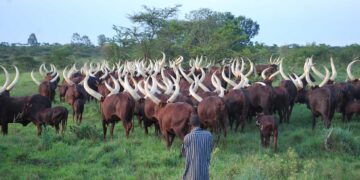President Yoweri Kaguta Museveni has issued Executive Order No. 2 of 2025, addressing the “unplanned and, sometimes, indisciplined movement of the Balaalo, pastoralists, into Northern, Eastern and North-Western parts of Uganda.”
The order, dated June 1, 2025, aims to curb escalating conflicts over land and resources and to prevent the spread of diseases.
The Executive Order follows an earlier directive, Executive Order No. 3 issued in 2023, and emphasises the technical impossibility of maintaining “a healthy, mutually beneficial and conflict-free movement of unregulated cattle movement into those areas of our Country.”
President Museveni outlined four primary reasons for the new directive: unfenced grazing areas and lack of permanent water sources — even when farms are fenced, a lack of consistent water sources drives herders to seek new pastures and Intra-community land tenure disputes — a lack of consensus on land tenure among indigenous communities often leads to conflict, “and even murders as a consequence.”
The president cited criminal and unfair practices, stating, “It is criminal and very unfair to the locals to introduce free–ranging cattle in these areas because they will inevitably trample and feed on people’s crops (Okwonesa).” He further noted that in dry seasons, pastoralists “will have to kuhaangaanga (look for distant water sources) for water,” resulting in the cattle “inevitably kwoona (eat crops in the gardens)”.
On communal land and land sales, the president said that the communal land tenure system, coupled with individual land sales, can lead to disputes when “intra-locals land conflicts will now be fused with the outsiders coming in. This is a recipe for big trouble.”
The order explicitly bans the “primitive spreading of land misuse that, moreover, disturbs the indigenous communities by free-ranging livestock eating their crops (Okwonesa).” President Museveni directed the Attorney-General to draft a law criminalising this practice.
Two long-term solutions are proposed in order: a complete ban on any movement of free-ranging livestock from outside these areas and criminalising the practice, and the establishment of a committee to audit claims of legitimate land purchases and secure fencing, ensuring permanent water sources and unblocked access to water.
The President also highlighted a serious health concern, stating, “It should be remembered that these blind actors had, at one time, invaded Tanzania-going into the National Parks of that Country, etc. These indisciplined actors have been responsible for repeatedly importing Foot and Mouth disease from Tanzania, leading to the closure of the modern dairy and beef industry of Uganda for months.”
Museveni reiterated the NRM’s commitment to “Patriotism, Pan-Africanism, Social-Economic transformation and Democracy,” emphasising that these principles enable the guarantee of prosperity through a bigger market and raw-materials base. He stressed the importance of economic and political integration within East Africa, advocating for “free movement of goods, services, labour and capital.”
However, he cautioned against “rural peasant migration – where peasants are transporting primitive agricultural practices from one rural area to another, claiming okufuunda (being over-crowded)”, arguing that this crowding is “actually artificial; it is on account of the primitive misuse of the land they have”.
Addressing concerns about land ownership, the President questioned the legitimacy of some land acquisitions, asking, “What type of land did you buy since most of that land is clan land? Did somebody sell you legitimately private land, or was it family or clan land, fraudulently sold by crafty individuals?” He also condemned the blocking of access to permanent water sources like the River Nile, calling it “a very serious mistake.”
The President concluded by emphasising that colonial style unfairnesses should not and cannot happen under the NRM He reiterated the message to “manage that land yourselves and stop excuses to divert us,” underscoring the government’s resolve to address the issue decisively.











